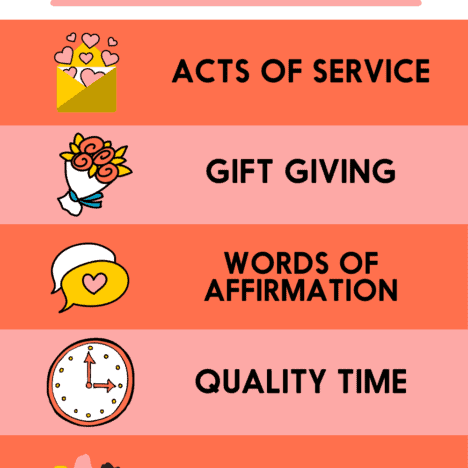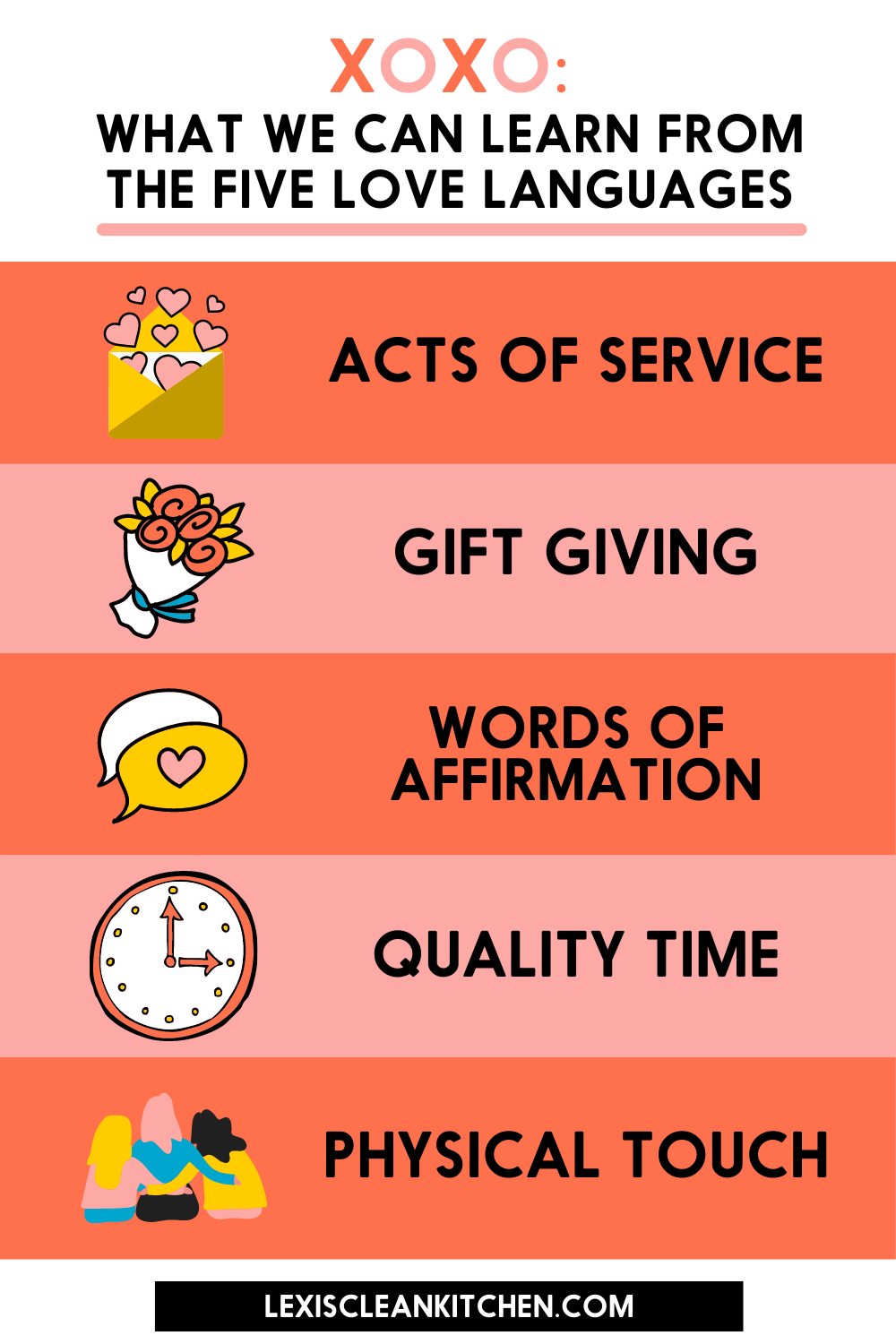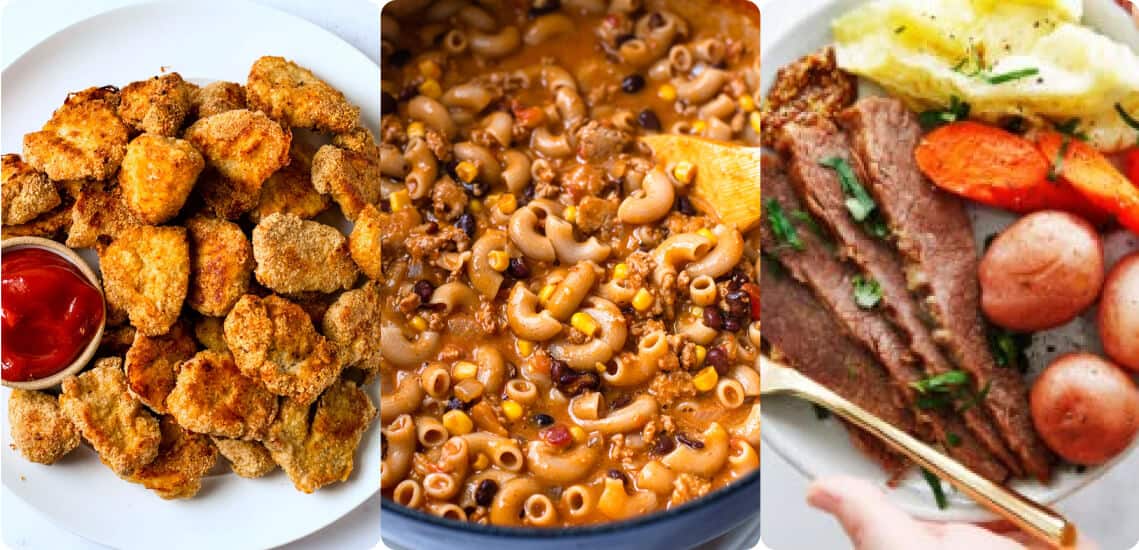This post may contain affiliate links. Please read my disclosure policy.
We’re taking a look at how understanding the “languages” spoken by all of your loved ones can help improve the relationships in your life! This deep dive will help you celebrate all of the special relationships in your life — on Valentine’s Day and beyond!
What We Can Learn From the Five Love Languages
Valentine’s Day is upon us! I know. I know. People have strong feelings about this holiday — in all kinds of directions.
Maybe the mere mention of the phrase “Valentine’s Day” inspires you to roll your eyes and let out an annoyed sigh. You think to yourself, This isn’t even a real holiday!
Or maybe you fall in the other camp! Thoughts of February 14th take you back to childhood memories of making cards and snacking on delicious treats. The occasion makes you feel all warm and fuzzy inside! You’re excited to celebrate Valentine’s Day, especially after a year that has felt light on celebrations for so many of us.
Here’s the thing: no matter where you stand on the Valentine’s Day issue, I think we can all agree that it never hurts to be reminded of the importance of checking in on and appreciating the most meaningful relationships we have in our lives. And I’m not just talking about romantic relationships!
Why shouldn’t Valentine’s Day be an opportunity to celebrate everyone we love?
Personally, I think it should be. This year, I’ll be embracing February 14th as a day to love that much harder on my people — Mike, Skye, my family, and my friends. (And even my pups!)
I know people say that you shouldn’t need a day on the calendar to tell people you love them and I get that, but life gets crazy, and it never hurts to have a little reminder of just how important those people are. It also never hurts to find new ways to connect with them and to make your relationships even stronger. One great tool for doing this is the Five Love Languages.
The Five Love Languages are a really simple way to break down the ways in which love can best be communicated within each relationship in your life. Again — it goes beyond romantic relationships! With a general understanding of these love languages, you can gain new insights about how to improve your rapport with friends and family members, too. I genuinely believe that we all have something to learn and gain from this.
First, a little history. These languages are the brainchild of Dr. Gary Chapman, who wrote a book called The 5 Love Languages. The book was published back in 1992, but has since sold more than 13 million copies! Dr. Chapman’s ideas have gained traction among so many people, and even people who haven’t actually read the book may be familiar with what’s in it.
While the original Love Languages book was written for romantic couples, it can be applied in much bigger ways. In celebration of Valentine’s Day (and the many people we love!), let’s break this down a little further.
Why Love Languages Matter
The Love Languages are all about figuring out how the people you care about prefer to accept love. We call them “languages” because it’s the best analogy for the concept. Think about it: if you’re attempting to have a conversation with someone who doesn’t speak the same language that you do, your communication is going to be very limited. The other person might be able to pick up on your facial expressions and your body language, which will give them a sense of your mood and how you’re feeling about them, but you’re never going to get to the heart of the matter. In order to do that, you need to speak the same language.
That’s how it works in relationships, too! You can do a pretty good job of expressing your love for another person without technically knowing their love language, but there might be some accidental gaps in your communication. This can lead to a lot of frustration in relationships. After all, you might be doing everything you know how to do to show someone how much you care… and they might not be totally getting it. It might be because you don’t know their love language.
You may have been on the receiving end of this. Imagine this: you have a friend who is super generous with compliments. She never misses an opportunity to tell you that you look great, are great, and are generally crushing it at life. Those things are nice to hear! But there’s still something about the friendship that’s not sitting right with you. It might be because your friend doesn’t seem to care very much about whether or not you spend a lot of quality time together, or because she’s not big on gifts for special occasions, or because she can’t necessarily be counted on to give you a ride or help you with an errand when you need it.
Here’s the deal with that situation: your friend’s love language is words of affirmation. This is how she best shows people that she loves them! As far as she knows, she couldn’t be clearer about her feelings about your friendship. But maybe you’re a quality time or gifts or acts of service person. So while you know your friend loves you, you’re not feeling it the way she thinks you are.
This is a simple scenario, but you can imagine how much deeper rifts can build in relationships when there is a lack of understanding of each person’s love language!
How to Use Love Languages
To make the most out of the love languages concept, it’s helpful to understand that you might have two love languages — one that you use to show love and one that works best for you to receive love. For some people, these languages are the same. For others, they are different. Get clear on both of yours to maximize the quality of your relationships.
As you might imagine, it’s also helpful to get clear on the love languages of your nearest and dearest! Once you have a better understanding of the languages yourself, you might be able to guess the best language for others. But you can also just ask! You can even make an event of taking a love languages quiz alongside a friend, family member, or partner. When everyone gets clear on what love languages are really being “spoken” in their circles, love is bound to flow a little more freely, since there will be better understanding. And don’t we all just want to be understood?
Fun fact: you probably have one primary love language, but others might resonate with you, as well. It is possible to connect with multiple love languages — just be sure you take the time to think about which one is really the most effective for you. Communicating that information with your loved ones can seriously cut back on the frustration in your relationships.
A Quick Note on Love Languages and Kids
Dr. Gary Chapman followed up his original love languages book with The 5 Love Languages of Children: The Secret to Loving Children Effectively. As you can probably guess from the title, it takes a closer look at how the concept of love languages can be applied to your kids! Different kids look for love and attention in different ways, and the same five love languages that we apply to adults can be applied to children, too.
As with all “typing” systems and assessments, experts will tell you to be cautious when making assumptions about which love language is best for your children. It can be easy to project on our kids! That being said, it’s never too early to start keying into the kinds of requests that your little ones are making of you. The requests that they make again and again — whether for presents or time together or cuddles or conversation or assistance — might just correspond to their love language!
Here are the five love languages…
Plus a few actionable ways to use them!
Words of Affirmation
If your love language is Words of Affirmation, you feel most validated and cared for when you are on the receiving end of positive written or spoken words. Words of affirmation might come in the form of praise, compliments, empathy, or support.
You or someone you know might fall into this love languages category if you/they love getting thoughtful cards, tear up during a birthday toast, or crave verbal closure at the end of an argument.
You can better communicate with someone who has Words of Affirmation as their primary love language by…
- Taking the time to tell them what they’re doing well
- Openly expressing your gratitude for them
- Randomly texting them to tell them you love them
- Encouraging others to share their favorite things about them on a birthday or other milestone
- Finishing up any disagreement by acknowledging what you love about them
Quality Time
As you can probably imagine, the Quality TIme love language is all about, well, quality time. And we’re not just talking about sitting next to each other watching TV.
What we mean when we talk about quality time is real, dedicated time when people actually have a chance to connect with each other. If you feel especially close with someone after spending time with them, this just might be your language of choice. And if someone you know seems particularly refreshed and calm after spending time with you, the same may be true for them.
You can better communicate with someone who has Quality Time as their primary love language by…
- Being the one to initiate plans for quality time with them
- Setting up dedicated time without screens and devices to spend together
- Coming up with creative plans
- Being as present as possible when you spend time with them
Gifts
Do you feel especially loved by someone after they get you the perfect gift? Do you obsess over finding the perfect gift to give others?
It doesn’t make you superficial or materialistic. It probably means that Gifts are your love language! This one’s pretty simple: it’s all about giving people meaningful, personal presents that show them how well you know and understand them.
You can better communicate with someone who has Gifts as their primary love language by…
- Looking for small, thoughtful gifts for them on random occasions — don’t wait for a holiday!
- Taking the time to find them special, thoughtful gifts for big moments (even if they’re not expensive or fancy)
- Putting extra time and energy into wrapping your gifts
- Appreciating any gifts they give you as expressions of how they feel about you
Acts of Service
The Acts of Service language works best for people who experience a burst of warm fuzzies when a loved one takes an action on their behalf or does something to help them. It goes a little deeper than that, though, because in order to truly express love through Acts of Service, you have to pay close attention to what the other person wants or needs. People who love Acts of Service aren’t just appreciating the action itself — they’re appreciating the fact that someone was paying that kind of attention to them!
You can better communicate with someone who has Acts of Service as their primary love language by…
- Taking care of tasks around the house without being asked
- Checking in with a friend or loved one while you’re out and about and asking them if there’s anything you can do or pick up for them
- Showing up to help with a task or project that you might be especially good at (and that the other person might find stressful or difficult)
- Planning a party or event to celebrate them
Physical Touch
This one’s pretty self-explanatory! It’s all about using Physical Touch of all kinds to express love and affection for others. I’ll let you use your imagination for how this might play out in a romantic context, but it can apply to your other relationships, too.
You can better communicate with someone who has Physical Touch as their primary love language by…
- Hugging them to say hello and goodbye (if/when it’s safe!)
- Sitting near them on the couch
- Rubbing their back
- Holding their hand
I hope this Love Languages deep dive will help you celebrate all of the special relationships in your life — on Valentine’s Day and beyond!









That is great to know about the language that expresses love. Keep sharing